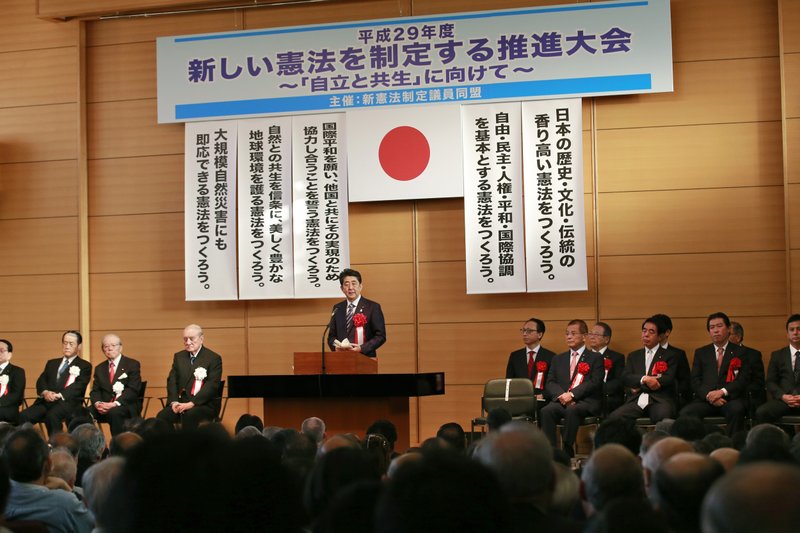TOKYO -- Japanese Prime Minister Shinzo Abe pledged Monday to initiate debate in the parliament on revising the country's U.S.-drafted constitution as he pushes to achieve a long-sought goal.
The democratic and pacifist charter took effect 70 years ago on May 3.
Abe, attending an annual rally on revising the constitution, said the time has come "to show the people, with confidence, our vision for the future of our country and what an ideal constitution should look like." Abe, who has long sought to amend the current constitution, attended the rally for the first time. The rally is organized by ruling party lawmakers and other supporters of changing the constitution.
"As an overwhelming No. 1 party, we are committed to lead a realistic and concrete discussion" in the parliament's constitution research council, he said. He said he will show the public how his government plans to preserve "a peaceful and affluent Japan as the country faces challenges ranging from the regional security threat to a shrinking population and workforce."
Demands for change have so far been led mainly by Abe's ruling party, rather than by the public, which has been split on the issue.
A recent poll by the Tokyo Broadcasting System showed that support for a revision has dipped in recent years, and two-thirds of respondents to another recent poll by public broadcaster Japan Broadcasting Corp. said debate on constitutional change has been insufficient.
Abe's Liberal Democratic Party and its nationalistic supporters have advocated constitutional revisions for years. They view the 1947 constitution as the legacy of Japan's defeat in World War II and an imposition of the victor's world order and values.
The charter renounces the use of force in international conflicts and limits Japan's troops to self-defense, although Japan has a well-equipped modern military that works closely with the U.S.
Proposed revisions to the constitution released by the ruling party in 2012 are intended to restore traditions similar to prewar family values centered on the emperor and place the national interest before individuals' basic human rights in some cases.
The current situation in and outside Japan is seen as helping Abe's push for constitutional revision. His party has large majorities in both houses, which is needed for constitutional change. Polls suggest the public's resistance to a revision of the pacifist constitution is loosening because of nearby North Korea's growing nuclear and missile threat.
A Section on 05/02/2017

